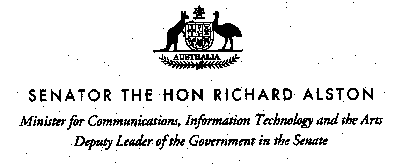
Dr Kamil Idris
Director General
World Intellectual Property Organization
PO Box 18
CH-1211 Geneva 20
Switzerland
Dear Dr Idris
In February 2000, the Australian Government convened a working group of officials from interested governments, public authorities and international organizations to discuss the issues raised by cybersquatting.
The meeting discussed issues concerning registration practices for both generic top level domains (gTLDs) and country code top level domains (ccTLDs ). It also discussed the current legal situation internationally in relation to the recognition of rights and the use of names in the Internet domain name system, including protection against cybersquatting, and identified areas of continued uncertainty.
The meeting noted that areas of continuing concern coincided, in a number of instances, with those that the Final Report of the World Intellectual Property Organization (WIPO) Internet domain name process, The Management of Internet Names and Addresses: Intellectual Property Issues, recognized as requiring further study. The Members ofWIPO, as listed in the Attachment, request the organization to initiate a study of, and develop recommendations in relation to, these issues.
We envisage that the scope of this study would explore the issues raised, in the domain name space, inter alia by bad faith, abusive, misleading or unfair use of:
- Personal names;
- International Nonproprietary Names (INN) for Pharmaceutical Substances;
- Names of international intergovernmental organizations;
- Geographical indications, geographical terms, or indications of source; and
- Tradenames.
This activity should take full advantage of WIPOs prior work and build on existing and ongoing discussions while allowing for a process of consultation with WIPO Members and all interested stakeholders. Further, in undertaking this process, it would be beneficial if any information received or collected concerning technical solutions to domain name collision control was collated for the information of WIPO Members and the Internet community.
These findings and recommendations should be submitted to the Members of WIPO and for consideration by the Internet community (including the Internet Corporation for Assigned Names and Numbers). We recognize this work would be undertaken as partial fulfilment of subprogram 03.4. Electronic Commerce and Intellectual Property, of the 2000-2001 Program and Budget, and look forward to its results.
Yours sincerely
![]()
RICHARD ALSTON
Minister for Communications,
Information Technology and the Arts
ATTACHMENT
Members of the World Intellectual Property Organization (WIPO) who request that WIPO initiate a study of, and develop recommendations in relation to, areas of continued uncertainty including the protection of personal and non-protected names within the domain name system:
Argentina
Australia
Canada
Denmark
European Union
France
United States of America
We understand that the Government of Brazil will also communicate its support for this letter through its diplomatic mission in Geneva.